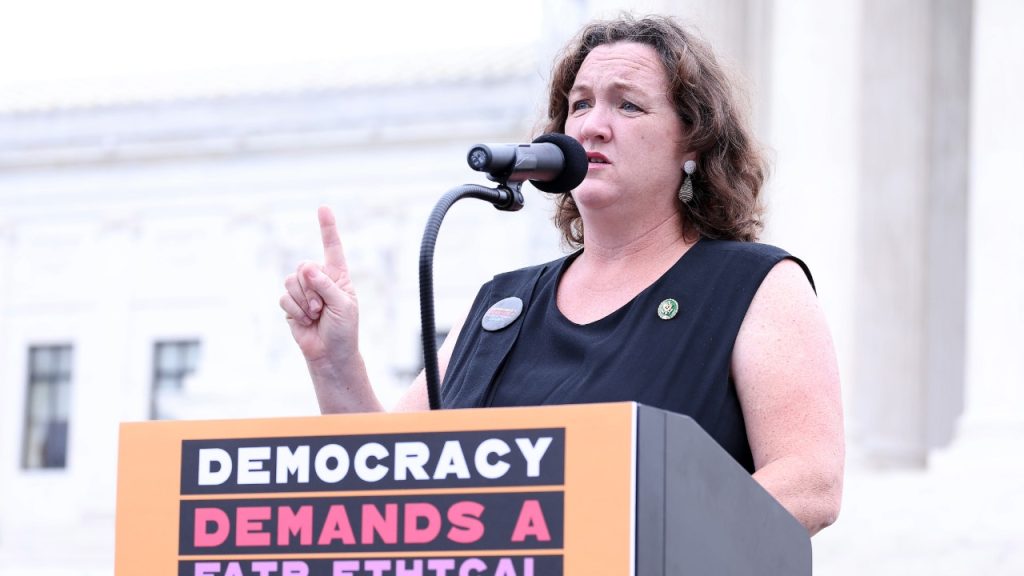Katie Porter’s Challenging Week: Footage and Interviews Reveal Heated Moments
In a week that has been less than ideal for California Democratic gubernatorial candidate Katie Porter, newly released footage and a contentious interview have drawn significant attention to her temperament under pressure. These incidents offer a glimpse into the challenges facing the former congresswoman as she navigates a high-profile campaign in one of America’s most politically influential states.
The first incident, revealed in video footage obtained by Politico, shows Porter during a 2021 video call with Energy Secretary Jennifer Granholm discussing energy and climate issues. When a staff member inadvertently walked into the frame of the video call, Porter’s response was immediate and harsh: “Get out of my f—ing shot!” she snapped, adding, “You were in my shot before that. Stay out of my shot.” The outburst, which occurred while Porter was still serving as a U.S. Representative, was notably edited out of the Department of Energy’s final version of the webinar. The footage offers a stark contrast to Porter’s public persona as a composed and detail-oriented politician who gained fame for her methodical questioning during congressional hearings. While staff interactions behind the scenes in political offices can often be tense, the recording provides voters with a rare unfiltered glimpse into how Porter conducts herself when cameras aren’t officially rolling.
Further complicating Porter’s week was a separate incident that quickly went viral, involving a tense exchange with CBS California reporter Julie Watts during an interview about California’s redistricting efforts. The conversation took a confrontational turn when Watts asked a straightforward political question: “What do you say to the 40% of California voters who you’ll need in order to win, who voted for Trump?” Porter’s response was unexpectedly defensive, questioning the premise with, “How would I need them in order to win, ma’am?” When the reporter explained the simple electoral math that achieving more than 50% would require appealing to some Trump voters, Porter appeared to take offense, claiming the question was “unnecessarily argumentative” despite Watts noting that other candidates had answered the same question without issue. What might have been a standard opportunity to present her vision to a broader audience devolved into a tense standoff that concluded with Porter attempting to remove her microphone and end the interview entirely.
The abrupt conclusion to the CBS interview revealed Porter at perhaps her most unguarded, stating “I don’t care” when reminded that other candidates had managed to answer the same question. Her follow-up comments that she didn’t “want to have an unhappy experience” and didn’t “want this all on camera” suggested a candidate uncomfortable with being pressed beyond her talking points. Political observers note that these types of exchanges are particularly revealing because they demonstrate how candidates handle pressure and unexpected challenges – qualities voters often consider when evaluating leadership potential. For Porter, who has built a reputation as someone who fearlessly questions others in power, the apparent discomfort when facing persistent questioning herself creates an interesting juxtaposition that voters may weigh as they consider her candidacy.
These incidents come at a critical time for Porter’s gubernatorial campaign, as she is considered by many to be the frontrunner in a race that will determine who leads America’s most populous state. California’s unique primary system, which advances the top two candidates regardless of party affiliation, creates a political landscape where candidates must appeal to voters across the political spectrum. Porter’s apparent resistance to discussing how she might engage with Trump voters could represent a strategic decision to focus primarily on her base, or it might indicate a blind spot in her campaign’s approach to coalition building. Either way, the visible frustration displayed in both incidents has given her opponents material to question whether her temperament is suited for the governor’s office, where handling difficult questions and maintaining composure are essential skills.
The conservative media landscape has been quick to amplify these moments, with Fox News and other outlets highlighting Porter’s responses as evidence of potential character issues. While all politicians have moments of frustration, the visual and audio evidence in both cases makes these particular instances difficult to dismiss or recontextualize. Porter’s campaign has yet to issue formal responses addressing either incident, creating a vacuum that critics have eagerly filled with their own interpretations. As the gubernatorial race continues to heat up in California, Porter faces the challenge of refocusing attention on her policy positions and qualifications rather than these momentary but revealing glimpses into her behind-the-scenes behavior and her approach to handling difficult questions. For voters still forming their impressions of the candidates, such moments can prove influential in shaping perceptions about who is best equipped to handle the pressures and scrutiny that come with governing America’s most populous and economically powerful state.
The coming weeks will be crucial for Porter to demonstrate whether these incidents represent anomalies or patterns, and how she chooses to address them will likely influence her campaign’s trajectory. Political careers are often defined not just by policy positions but by how candidates respond when facing unexpected challenges. For a candidate who rose to prominence through pointed questioning of others, Porter now finds herself answering difficult questions about her own conduct and communication style – a test that may prove as challenging as any policy debate she faces on the campaign trail. Whether she can effectively navigate these waters and regain control of her narrative remains to be seen, but what’s certain is that in today’s media environment, such unguarded moments rarely remain isolated incidents but instead become part of the larger story voters consider when heading to the polls.


